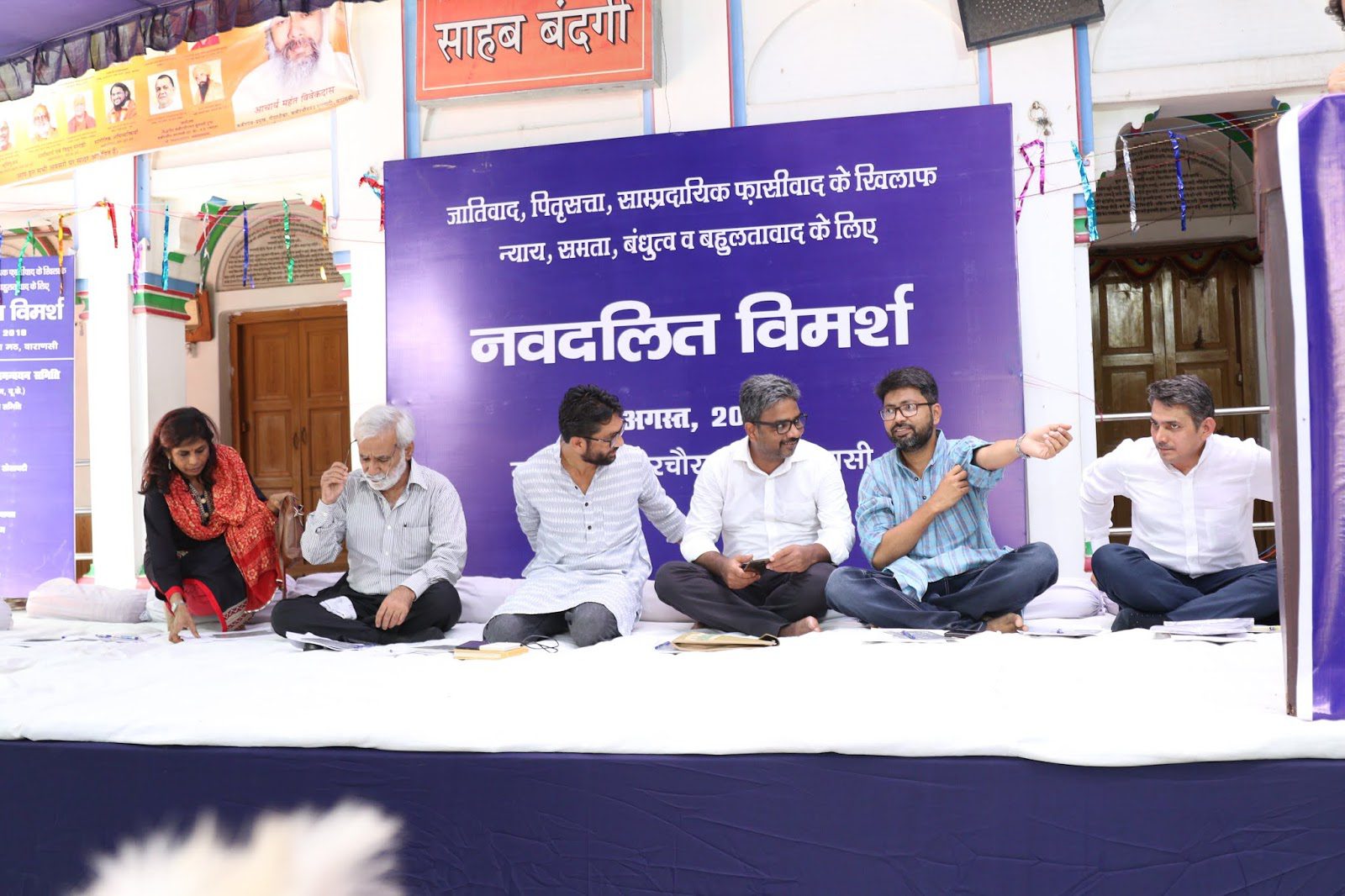Hindu caste system divides the society into social classes or castes. This graded inequality has the sanction of classical Indian religious scriptures. The caste hierarchy dictates the lives of its citizens even today. The tribal, Muslims and the lower castes or untouchable communities face discrimination and severe oppression due to their social status. As a result, they have been further
What is Neo-Dalit Movement?
‘Neo-Dalit’ movement is an attempt to unite Shudras and ati-Shudras to fight against Caste injustices and to shatter the ‘culture of silence and impunity’. “It’s a union of lower castes against the castes alienation, a union of religions against communitarian, a union of the poor against Neo-Liberalism are the three fights that need to be led by one community, the Neo-Dalits”, as Dr. Lenin Reghuvanshi has stressed.
Divisive electoral policies of upper castes, so far, would not have let the lower caste unite and fight in the pursuit of justice, equality and fraternity, thus, as Lenin, suggest, “we must create a unified social movement against the decadent Brahmanical caste system, Neo-Fascism and Neo-Liberal Capitalism”. He further put up a question, “but what means of fight should be adopted? How can such social movement of unity emerge? On which kind of struggle should it lead? These questions need to be asked”?
Hindu caste system divides the society into social classes or castes. This graded inequality has the sanction of classical Indian religious scriptures. the caste hierarchy dictates the lives of its citizens even today. The tribal, Muslims and the lower castes or untouchable communities face discrimination and severe oppression due to their social status. As a result, they have been further marginalised in the society and denied their basic rights. The severest human rights violations in India, the widespread use of custodial torture, are closely linked to caste-based discrimination.
A culture of impunity allows oppressor to oppress more without fear of punishment. This factor also allows the rise of a Neo-Fascism state – an authoritarian state, which wants to make one country with one nation – and the implementation of an aggressive Neo-Liberal capitalism – which perpetuate social and economic injustice. In this way, we would see how the Neo-Fascist Hindutva project is perpetuating caste domination and principally supports Hindutva politics of corporate fascism preferring big business houses interest over ordinary citizen of India. Economic deregulation has marginalised lower castes and has increased division among people.
This hegemonic policy of oppression needs to be challenged. This can be done through mobilisation of marginalised people and by supporting grass root social movement struggling against Caste System, Communal Fascism, Patriarchy, and Neo-liberalism. And Neo-Dalit movement could provide some alternatives. In this connection, Dr. Lenin’s NGO People’s Vigilance Committee on Human Rights (PVCHR) has been consistently putting effort; torture free model village, is one such example.
The Neo-Dalit movement is a sign of hope, honour and human dignity for the most marginalised people facing discrimination based on race, caste, religion and gender. The Nelson Mandela model is the path for PVCHR’s Neo-Dalit movement to bring unity of different communities against the caste system, feudalism, communal-Fascism and Neo-Liberalism, through reconciliation for justice and human dignity against the culture of impunity based on silence.
Neo-Dalit Convention 2018: A viable Alternative
In order to provide impetus to Neo-Dalit movement, on August 9th 2018, a convention was organised by the People’s Vigilance Committee on Human Rights (PVCHR) in Varanasi, India. The convention’s objective was to celebrate the ideas of justice, equality, fraternity and pluralism.
Dr. Lenin, the founder of PVCHR, has emphasized that the convention was meant to unite the broken people of all caste and religions and to fight against the caste system, communal fascism, politics

Jagriti Rahi (Varanasi), Uday Kumar (Bihar) and Pradeep Garg from Uttarakhand, were awarded Jan Mitra Award, for their commendable work in the area of human rights. A book by social scientist, Amit Singh – Conflict of Freedom of Expression and Religion and another by senior writer and thinker, Kanshi Ram Ji and Moolchand Sonkar – First Japan Trip were also launched at the event.
Senior journalist and founder of Media Vigil, Pankaj Srivastava advocated on the “elimination of anger”. He said that the agents of fascism, have captured Ram, Shiv and Parvati. He suggested that the rulers and politician must read about the character of Shri Ram. He further explained how politics has changed the nature of God- from the protector to the one who is full of rage and anger. He also mentioned how we had been taught since our childhood, that our gods lived in harmony on the Himalayas with other gods. They show us the significance of peaceful co-existence.
Professor Ratan Lal, an intellectual, who teaches at Hindu college, explained that the caste system can never be eliminated if Brahmanism remains. The two have originated from a composite culture. Caste System can be destroyed only when Brahmins too, start organising anti-caste movements.
Jignesh Mevani, Member of Gujarat Legislative Assembly and a prominent Dalit activist, pointed out that Uttar Pradesh does not need the ideology of BJP, but that of Kabir, Raidas and Buddha. He further stressed that the Indian Constitution can be protected only when the people of India understand the ideals of Kabir, Raidas and Buddha. Taking a dig at the ruling party, he said that their work is to break our unity and our duty is to spread love. He emphasised that the need of the hour is to be united as an opposition. Mevani further said, Mathma Gandhi is the father of the nation, and Dr Ambedkar is the father of modern India.
Senior journalist, television anchor, author and ex-director of Rajya Sabha TV, Urmilesh, suggested that to fight against contemporary fascist forces; everyone needs to be united and forgetting their personal differences. He mentioned the recent election of Deputy Chairperson of Rajya Sabha, in which NDA won, and opposition lost; even though they have claimed that they were in the majority. He warned that as 2019 elections are getting close, the ruling party might play new tricks and people have to be more responsible so they no longer fall for the jumlas.
Senior social worker and chairman of Congress Sevadal, Lalji Desai lambasted those who have a Manuvadi mentality and practice inequality. He also stressed on the necessity to struggle for equal access to education, right to food and employment. Shri Nadeem Khan, of United Against Hate campaign, also gave a speech foregrounding that- justice shall prevail, not the revenge!
Neo-Dalit Convention, certainly, have pushed the agenda of justice, equality and fraternity into the mainstream media and politics, and usefully have challenged the Brahmincal Caste structure, communal fascism, patriarchy, and policy of neo-liberalism. To certain extent, this Convention has united broken people and have generated hope in the dark times of politics of hatred.
©Amit Singh
Photos from PVCHR
#CoverStory #Advocacy #CasteSystem #IndianSoceity #BrahmincalCasteStructure #PoliticsAndReligion #CasteAndPolitics #Hatred #IndianReligionAndPolitics #Dalit #DifferentTruths





 By
By
 By
By
 By
By